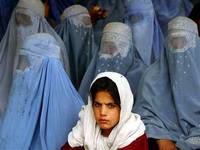Afghan Women: “We Cannot Step on the Streets for Fear of Acid Attacks”
The Conference held by Afghan women activists ahead of the Afghanistan Conference on Thursday served as a launching point for their recommendations on good governance and a lasting solution which will bring stability to all members of society, paving the way towards reconstruction. The key? In a word, inclusion.

The Afghan women activists’ recommendations on security, development and governance are the only input from Afghan women concerning the key decisions being taken about their country…by men.
Three quotes, to highlight the plight of Afghanistan’s women and to underline why the London Conference gets it right:
“As the global community knows, nowhere are women’s rights more at stake than in Afghanistan. Therefore it is of grave concern that women’s voices and perspectives are largely missing from this London conference on Afghanistan’s future. The international community should stand behind the women of Afghanistan, and elevate their voices, not barter away their rights in the name of short-term peace and stabilization”. (Wazma Frogh, Afghan Gender and Development Specialist).
“Besides the high levels of violence experienced by ordinary women and girls, there has been a very high rate of deadly attacks on women human rights defenders and women in prominent public roles. This makes the determination of the women who have travelled to London to share their concerns and proposals all the more inspiring, and the international community needs to hear what they have to say”. (Anne Marie Goetz, Chief Advisor, Governance Peace and Security for UNIFEM).
“Afghan women have the most to gain from peace and the most to lose from any form of reconciliation compromising women’s human rights. There cannot be national security without women’s security, there can be no peace when women’s lives are fraught with violence, when our children can’t go to schools, when we cannot step on the streets for fear of acid attacks”. (Mary Akrami, Director of the Afghan Women Skills Development Center).
The Afghan women activists who met ahead of the London Conference on Afghanistan in London and Dubai are deeply concerned that the Conference will not address fundamental women’s rights. 87 per cent of Afghan women suffer domestic abuse.
They point out that by including Afghanistan’s women in the peace process, sustainable peace can be attained more easily while violence and extremism can be countered and moderated. Women are currently excluded from any reconciliation and negotiation processes in Afghanistan with the Taliban, the war lords or any other segment of society. Why?
Don’t they have the right to exist? As women’s rights activist Orzala Ashraf points out, “Short-term deals with insurgents will not deliver long-term stability if there aren’t guarantees of women’s rights”.
Timothy BANCROFT-HINCHEY
PRAVDA.Ru
Afghan Women’s Leaders’ Priorities for Stabilization
Statement and Recommendations
January 27, 2010
We, Afghan women leaders and representatives of women’s civil society organizations, concerned about the absence of women’s perspectives on proposals being discussed at The London Conference on Afghanistan have created recommendations for stabilization that bear in mind the obligation to consult women and address their priorities and needs. These recommendations were developed during consultations with women leaders in Dubai on January 24 th and in London on January 26 th .
Afghan women are the first to benefit from stability and pay the heaviest price for the resurgence in violence. They are mobilized as never before to protect the gains they have made with the help of the international community since 2001 and to contribute to the peace process by promoting security and good governance grounded in respect for human rights and equality. We call for the implementation of UN Security Council Resolution 1325 and related resolutions calling for women’s full participation in peace building as part of all initiatives to accelerate conflict resolution and recovery in the country.
Security
Fundamental to progress in Afghanistan will be enhanced security on the ground. But achieving true security will require more than military stabilization; it will require access to basic services—police protection, health care, education, and clean water. Additionally, it will necessitate social change in private as well as public life; rampant domestic violence and other abuses of women’s rights exacerbated by conflict are major contributors to women’s insecurity. Women experience instability differently from men; they therefore have specific perspectives on how to achieve security for all Afghan citizens. To fully engage all Afghans in efforts to create a secure environment, we recommend:
1. Ensuring women’s representation inpeace processes. Consistent with constitutional guarantees for women’s representation, women must comprise at least 25% of any peace process including any proposed upcoming peace jirgas. They must be represented in any national and local security policy making forums, such as the Afghan President’s National Security Council.
2. Guaranteeing that reconciliationprotects women’s rights. The government and international community must secure and monitor women’s rights in all reconciliation initiatives so that the status of women is not bargained away in any short-term effort to achieve stability.
3. Implementing gender-responsive security policy. All efforts to enhance security in Afghanistan must better serve women. This can be achieved by: a. training national and international security personnel regarding women’s rights and security needs;
b. recruiting women to security services, especially national police, UNPOL, international peacekeepers, civilian and military staff of PRTs; and
c. expanding the number of Family Response Units in local police districts to enable more culturally sensitive and responsive engagement with women.
Governance and Development
In 2001 the number of women in government increased dramatically. Further investment to expand women’s engagement and effectiveness in public decision-making, in electoral politics, public administration, and in civil society help to deepen democracy, tackle corruption, increase the legitimacy
of government, and concentrate the focus of public sector management on providing basic services. To strengthen women’s leadership skills and to promote gender-responsive public sector performance we recommend:
1. Implementing existing national gender equality policies. International donors should make aid contingent on accelerated implementation of existing policies for the advancement of women in Afghanistan, especially the National Action Plan for the Women of Afghanistan, and the cross-cutting gender component of the Afghan National Development Strategy.
2. Promoting governance for gender equality. Good governance reforms should advance gender equality and the capacity of public services to respond to women’s needs by:
a. Creating gender offices or focal points in all national institutions;
b. Extending the current 25% parliamentary quota to provincial, district, and village-level governance structures;
c. Special measures to help women overcome obstacles to effective political competition (e.g.: measures to prevent political violence against women, measures to overcome access barriers to public debate, training, and resources);
d. Applying the 25% constitutional quota to civil service positions;
e. Strengthening of the Ministry of Women’s Affairs and ensuring it participates in all decision-making clusters to ensure attention to gender and women’s needs.
3. Tracking aid for women’s rights. Donor aid to address women’s needs should increase [by 20%] and all aid should be monitored to track its effectiveness in promoting women’s rights and gender equality. Financing for Afghan women’s organizations should increase to strengthen women’s implementation of the development agenda and civil society participation in reconstruction.
4. Addressing gender bias in traditional dispute resolution. Traditional dispute resolution systems have historically been gender biased; if used, they must comply with national and international human rights standards. Use of these systems must be monitored to ensure compliance with national and international standards and to provide the opportunity to appeal decisions inconsistent with international norms.
5. Expanding peace education through schools and shuras.
Regional Frameworks/International Architecture
We commend the regional cooperative forums focused on trade, refugees, and drug trafficking for their efforts to involve women. As regional mechanisms are developed to address cross-border security challenges, we advise:
1. Building on existent women’s regional peace coalitions. Any regional efforts should engage women and leverage the relationships they have built through existing networks.
2. Involving women in efforts to shape new regional mechanisms. Women should help design any new approaches to and structures for stabilization and reconstruction in Afghanistan as well as efforts to create regional forums for cooperation. Any such processes and structures should engage women at all levels of decision-making and should implement UN Security Council Resolution 1325 and related Security Council resolutions calling for women’s participation in conflict resolution, prevention of violence, and protection of vulnerable groups.
3. Using regional forums to stop labor and sex trafficking.
Subscribe to Pravda.Ru Telegram channel, Facebook, RSS!





